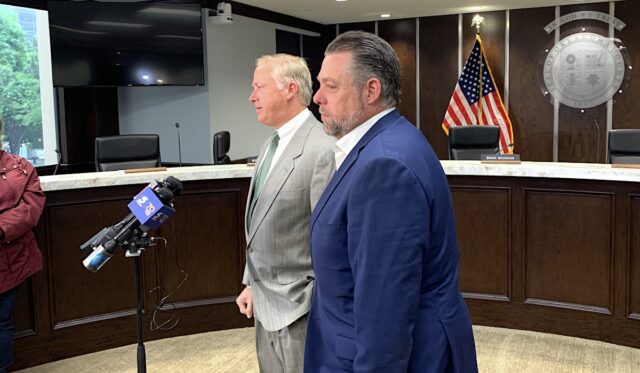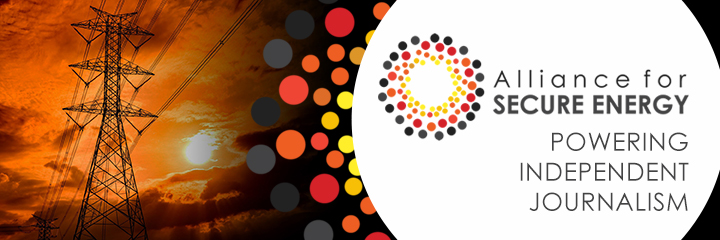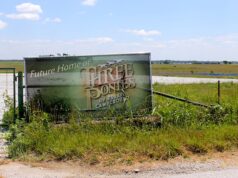
Oklahoma County’s Board of Commissioners is reviewing two new potential jail locations, reexamining their application that was recently rejected by the Oklahoma City Council and considering their options for asking a court whether a county even needs municipal zoning approval to build a detention facility.
While Monday morning’s meeting yielded no final results, commissioners noted afterward that they are keeping their options open in pursuit of a new jail location, which has eluded them for more than a year. Following the OKC City Council’s May 21 decision to reject a zoning change for a proposed jail location at 1901 E. Grand Blvd., commissioners are still exploring whether to seek a court determination that the county has “sovereign” authority to build the jail there anyway. And even if the jail ultimately is not built on the Del City-adjacent property, the site could still become home to the county’s new behavioral health center, which is estimated to cost around $45 million to build.
During Monday’s meeting, District 2 Commissioner Brian Maughan motioned for the county engineer to renegotiate the contract for the 1901 E. Grand location so it can “fully optimize” the county’s opportunities to build a mental health facility on that site.
Maughan and District 3 Commissioner Myles Davidson voted for the motion. District 1 Commissioner Carrie Blumert voted against it. Blumert has steadfastly opposed the 1901 E. Grand site since it came under consideration, owing to objections from residents and a desire to locate the new jail closer to services that detainees might need post-release.
Mental health facility also in limbo as clock ticks on ARPA funds
Maughan said the county remains at risk of losing American Rescue Plan Act funding to build the mental facility if commissioners do not act soon to find a site. Under federal law, those funds must be encumbered by the end of this year, and they cannot be used to build the jail itself.
“My motion was to direct him to renegotiate the contract,” Maughan told reporters after the meeting. “It was on a contingency basis when we submitted it to the city council. And so, we’ll have to have that changed if we plan to have any other optimization of it, even if it doesn’t include the jail. If we have the opportunity to go forward and build the mental health facility, obviously the $50 million at stake we want to go forward.”
Davidson said the mental health facility would cost between $40 million and $46 million to build.
The addition of a mental health facility has become a sticking point for the People’s Council for Justice Reform, a local grassroots activist organization that has opposed locating a mental health facility near the jail. Organizer Mark Faulk said too many questions remain about the proposed facility.
“Originally, it was going to be a mental health facility inside the jail, and we have complained about that,” Faulk said. “As we’ve said before, we have sent letters to the federal government, because we believe that it’s not legal. They then moved it one foot from the new jail as a feeder to the jail, and that is still not the appropriate answer. What we want to know is, even if it is built separately, who is going to run it? Will it be Turn Key, which has an atrocious history even just running medical facilities in jails with dozens of lawsuits, over 100 nationally? What we want to know is, will we continue to criminalize and traumatize people who have mental health issues?”
Davidson said locking people up is not the purpose of the proposed mental health facility.
“These are people in crisis, these are people that need help,” Davidson said. “These are exactly the things we could do today to correct the issues that we’ve been seeing in the jail for the past week.”
The jail has seen a recent spate of deaths, including two since May 28. The most recent detainee death has been attributed to a suicide, according to jail officials.
“One of the reasons that we have mental health issues at the jail is because when they built the jail, they didn’t address the ability to have mental health patients inside the jail,” Davidson said. “Now we’re the largest mental health facility in the county, and questionably, the state. This behavioral health center will allow us to visualize and address somebody’s mental health crisis longer than the mandated federal timeline.”
Maughan: OKC Council decision prompted ‘sovereignty’ convo
At least one Del City resident offered their perspective about the concept of county sovereignty during Monday’s meeting. Speaking during the public comment section of the meeting, Cynthia Ciancarelli said the county would be overstepping its bounds by pursuing litigation to override the OKC City Council’s zoning rejection.
“Myles, you ran on fighting federal overreach. How is this any different?” she said. “You disagree with the Oklahoma City City Council decision, and you look for a workaround claiming some form of sovereignty. If this happens, you’re opening up a can of worms. You set a precedent that every county in every state has the authority to override a city, that the county is now the governing body, not the cities. That’s quite a bit of power you’ve bestowed on yourself.”
Davidson told reporters after the meeting that it’s still possible the jail could be built on the 1901 E. Grand site. In his view, he said Oklahoma law allows counties to override local municipal government decisions.
“I think it’s a basic constitutional structure,” he said. “The Oklahoma Constitution was set up that way. Ninth-grade civics, federal, state, county, municipality. We all learned it, and that’s where we’re at.”
Maughan said invoking county sovereignty would not be his first choice.
“It wasn’t my preferred tact to try and do this,” Maughan said. “But with the city not giving us many choices, we went to the Grand site. I’d stress again, not because it was the first preference for me but because we were led to believe that’s where the city would zone after they had already offered the airport and then withdrew that offer. And so, it seems to be that no matter where we go, we’re going to have to put up with this fight.”
Maughan said in his conversations with city officials there is no consensus on where the jail could be located downtown, nor is there an answer for the added costs that might be incurred with once again using a tower design. Maughan has steadfastly opposed a high-rise jail because of the current facility’s long-term history of problems associated with its design.
“In individual conversations I’ve had with several of the council members, they’re not even in agreement about where downtown we would go if we did build down there,” he said. “And certainly, none of them have any suggestions about how to pay for the additional $90 million cost of going back to a vertical tower versus building horizontally, which I have stayed consistent about from the very beginning.”
At the end of Monday’s meeting, commissioners briefly discussed where other potential new jail locations could be found. The two possibilities included:
- 160 acres at the southwest corner of Southwest 74th Street and Rockwell Avenue; and
- Up to 40 acres located near Reno Avenue and Exchange Avenue.





















